By Felicity Darville
THE term Bahamian “son of the soil” could never be more true or have such literal meaning as it does for Dr Robert Taylor. He is a soil scientist and environmental chemist whose expertise has been utilised throughout the United States, including Alabama, Tennessee, Virginia, Michigan and Florida, and even extends throughout the world. His work in the study of the soil has been critical to crop performance in the agricultural industry in the US.
Taylor’s research includes soil and environmental chemistry, plant science and soil and water pollution. He has received grant funding of over $15 million for research projects with over 200 research papers and publications.
We recently met after he made a presentation during a scholarship announcement for Florida Agricultural and Mechanical University (FAMU). The CA Smith International Educational and Community Development Foundation is partnering with Dr William F Pickard, Honorary Consul for The Bahamas in Detroit to create the Friendship Alliance Scholarship fund, with a multi-million dollar commitment.
In this case, four students from Detroit and four from The Bahamas will be the recipients of a full tuition scholarship to study agriculture under Dr Taylor, who serves as the university’s Dean of Agriculture and Food Sciences.
During the announcement, Dr Taylor expressed enthusiasm for the opportunity to work with Bahamian students in a field that his home country so desperately needs more expertise in. He said Bahamians who choose FAMU would feel “right at home” and committed to doing his best to serve their educational needs during their length of study.
He has been in the shoes of the many hopefuls with aspirations of higher education.
A young Robert attended Xavier’s Middle School, then St Augustine’s College where he completed O Levels.
He went on to The Government High School to do his A Levels.
He worked at the Botanical Gardens for a year and during that time helped create the beautiful landscape of a variety of flora and fauna for which the gardens are known. At the time, it was called the Experiment Station and there, he was inspired by Godfrey Eneas, an agricultural expert who was one of the first Bahamians to become formally educated in the field.
By 1967, he went off to study at Tuskegee University then Michigan State – a track that Prince Bonamy also took. They both became among the first Bahamians to receive their PhDs in Agriculture.
A decade later Taylor was back in The Bahamas, assigned by the Ministry of Agriculture to work on the Bahamas Agriculture Research Training and Development project (BARTAD) in Andros. This $10 million project was started from a partnership between the Bahamas Government project and USAID. It began as a livestock project but broadened to include a wide spectrum of agricultural research.
Scientists from Pennsylvania State University worked on the project with Bahamian project managers such as Earl Deveaux.
There, Taylor worked as a soil scientist and travelled throughout the country researching the specific soil qualities on the islands. He created numerous bulletins documenting the findings of his research on Bahamian soils and what is needed to utilise them effectively for crop production. He devised special methods to test Bahamian soil, as general laboratory testing could not provide accurate results for our soil.
“I found that the Bahamian soil can be very productive if managed properly,” he told me.
“If we don’t, it could be very unproductive. We have to understand that because our soil has a high PH, being very alkaline because of its limestone content, it will be low in certain nutrients like phosphorous and the minor elements like iron, zinc, copper, manganese and so on.
“We must add organic matter to it. But our soil has an excellent capacity to hold nutrients because of its high cation exchange capacity.”
As a BARTAD scientist, Taylor also did research on specific crops to improve their production, including corn, cassava, Irish potato, pigeon peas, peanut and legumes. He had high hopes of seeing his research and those of his fellow scientists blossom into real changes in the agricultural industry in The Bahamas. But the project came to an end and many high hopes were dashed as there was no other research facility of its kind in the country.
Pointing to the dire need for Bahamians to be able to feed themselves, Taylor said: “We need to reinstate a place like BARTAD. We had specialists in every area. We used Bahamian expertise. We had specialists in areas like plant protection, animal scientists, horticulturalists who would grow stuff like avocados. We had the knowledge of how to use farm machinery. BAMSI (Bahamas Agriculture and Marine Science Institute) is a part of that (future of self sufficiency). But we need a wider range of expertise. Once you start growing crops, you will get a lot of insects and pests, and that can ruin a farmer. It must all be managed to bring success.”
For this reason, he welcomes Bahamian students to study at FAMU. He hopes to inspire them to take their expertise home and apply it where it is needed most. Dr Larry Robinson, University President, pointed out that FAMU has a long history of successful Bahamian graduates who have gone on to make an impact in their various fields of profession. He said Bahamian students have had a high student success rate and impressive grade point averages. He welcomed the Friendship Alliance Scholarship, which would bring more Bahamian students to the FAMU family. Coordinator Andy Ingraham is working to increase partnerships with Bahamians in the United States for even more scholarships to be made available, among other projects. The scholarship fund came about as a long held dream of William Pickard and Governor General CA Smith, who hold a friendship spanning over five decades.
“In order to compete in the global community and to survive in the highly technological era of this 21st Century, countries have to develop knowledge-based economies,” GG Smith said.
“ln recognition of this imperative, the Bahamas Government has not only established its own University but has allocated a substantial amount of its annual budget for educational purposes inclusive of agricultural, marine, technical, engineering and skills development. We are confident that the opportunities offered by the Friendship Alliance Scholarship for Bahamian students to study Agriculture and Business Studies at Florida A&M University will rebound in untold benefits to The Bahamas as we pursue a national goal of food sufficiency and food security.”
In addition to serving as the Dean of Agriculture and Food Sciences for FAMU since 2012, Taylor is also the Director of Land Grant Programmes. Before this, he was the Dean of the School of Agricultural and Environmental Sciences at Alabama Agricultural and Mechanical University (AAMU), where he also served as the Director of the Centre for Environmental Research and Training, as well as Professor of soil and environmental chemistry.
On a national level in the US, Taylor has been recognised by the Association of Public Land Grant Universities for his outstanding service.
He was appointed to the State of Alabama Forever Wild Land Trust by the Governor of Alabama, making him the first black person to serve in that capacity. For two terms, Taylor served on the United States Department of Agriculture (USDA) National Agricultural Research, Education, Extension and Economics (NAREE) Advisory Board, the only USDA board mandated by US Congress to advise the Secretary of Agriculture.
In 2007, Taylor was selected as a Caribbean Icon in Science and Technology.
Two years earlier, he was inducted into the Bahamas Science and Technology Hall of Fame.
In 2002, he was bestowed the National Science Foundation Distinguished Service Award after serving as Acting Deputy Division Director for Biological Infrastructure at NSF in Arlington, Virginia.
The Soil Science Society of America Journal - Soil Chemistry division welcomed him as an associate editor from 2009 to 2014.
In 2003, he received the 1890 Morrison-Evans Outstanding Research Award and in 2000, he received the 20th Century Agricultural International Development Award from Hisar, India. When Taylor graduated with a Bachelor of Science degree from Tuskegee University, he was Magna Cum Laude.
He went on to achieve a Masters Degree in Soil Microbiology from Michigan State University, where he also earned a PhD in Soil Chemistry. During his stellar career Taylor was also bestowed the honour as a Fellow of the Food Systems Leadership Institute, the Soil Science Society of America, and the American Society of Agronomy.

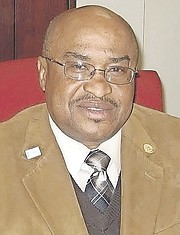
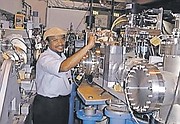
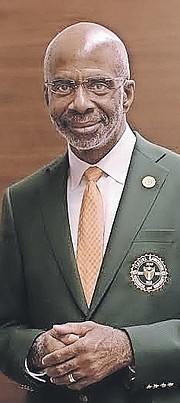
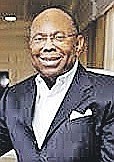
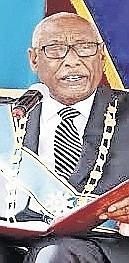




Comments
Use the comment form below to begin a discussion about this content.
Sign in to comment
Or login with:
OpenID